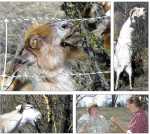Goat heaven: Grant funds vegetation cleanup

BARTLEY -- Landowners are happy. Grant writers are very pleased. And the goats think they're in hog heaven.
"This is goat heaven," Michelle Wendell said about the vegetation growing at sandpits near Bartley. "You could have a gazillion goats here." And they'd be as happy as pigs in slop.
Wendell, of Brewster, provided the 400 goats whose sandpit smorgasbord of saltcedar, red cedar, thistles and Russian olive trees was the subject of a $7,850 grant and study through Southwest Nebraska Resource Conser-vation and Development, based in Cambridge.
RC&D hired the goats and Wendell to see what impact the goats would have on the sandpit environment -- getting rid of unwanted trees and weeds without spreading seeds, without harming desirable vegetation and without spraying chemicals near the sandpits and the Republican River.
The goats grind their jaws and mulch their food, Wendell said, without much of a chance at all of the seeds reseeding through the goats' droppings. And they eat what cattle don't like, leaving the grass to their bovine pasture mates.
Landowner Ruth Sughroue is impressed with the goats and their weed-eating habits. "I love these goats. They are so cool," she said. Sughroue said she agreed to participate in the study after project manager Con Fielding of rural McCook contacted her, and her sandpit neighbors, Trevor Taylor and Paul Schaffert, agreed to the goat project. "It's like musk thistle," Sughroue said. "It doesn't do any good for one person to get rid of it. The whole neighborhood has to work together."
Wendell said the goats are doing their job on the sandpits, eating thistles to the woody stem and stripping the bark from saltcedar and Russian olives trees.
She said the goats would do an even better job of eating saltcedar after a cut-down cleanup effort, because they prefer young, tender sprouts and shoots to older, rank growth. "Goats would really shine after a saltcedar cleanup," Wendell said.
Wendell said that goats, like chemicals, require repeated applications. She said. "Our environment didn't get this way in one year. It can't be fixed in one year, either."
"Goats are not a quick fix," Wendell said. "but they're a great long-term solution ... a tremendous tool."
Roger Stockton, director of the RC&D, said he is pleased with the one-year goat grant project, which ends July 1.
"It was a good exercise," he said. "It's impressive to see what they've done in rough timber and brush."
Stockton will compile results of the study and report to the Nebraska Department of Economic Development, which funded the grant.
